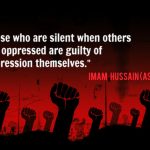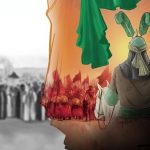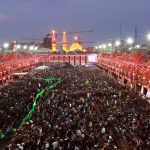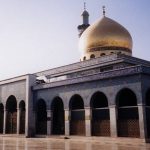
Ramona Wadi, a journalist and pro-Palestinian activist, has said that “The international community has created a web of spectators and passive activism, where slogans and awareness are given priority over Palestinian rights.”
“The sad reality is that unwittingly, a number of Palestine supporters have bought into the purported opportunities to ‘raise awareness’,” She told Shia Followers in an exclusive interview.
Following is the full transcript of the interview:
How has the International Quds Day and the events held on this day since it was initiated by Ayatollah Khomeini affected the Palestinian cause?
Ramona Wadi: I think we have a situation where various discrepancies in international solidarity with Palestinians are arising, when juxtaposed against the accelerated settler-colonial expansion. Apart from annual commemorations, most demonstrations take place as a response to Israeli aggression without taking into consideration the fact that Israel’s colonial presence in Palestine has been a permanent form of aggression since 1948. If one takes into account the Zionist ideology prior to the Nakba, Palestine has been oppressed since the late 1880s.
This is not to say that activism does not have noble aims, including Quds Day which has the potential to mobilise for Palestinian support. However, there are several factors that one has to take into consideration and which are affecting support for Palestine.
First of all, unless there is dedication to continue the mobilisation, these annual commemorations run the risk of remaining tethered to their anniversary, which defeats the purpose of mobilising international support for Palestine. We see the same thing happening with other demonstrations, as I said earlier, that are a response to Israeli aggression and therefore short-lived. If activism associates more importance to the event rather than with Palestinians, mobilisation will remain temporary and incapable of long-term vision and support. What happens after the demonstration is what nobody talks about – probably due to the fact that the immediate circumstances take over and people return to their lives, which is a natural occurrence. On the other side of the equation, however, the people we are demonstrating for – the Palestinians – remain oppressed under the same circumstances. We have to be aware of this contrast and find a way to bridge this gap, to assert the protest as an ongoing act for justice, rather than solidarity. Solidarity is temporary. It involves little effort and feeds into the narrative of organisations such as the UN, which offers rhetoric to Palestinians and substance to Israel, in terms of allowing it to continue its colonial expansion.
Therefore, if these events are to impart a resounding significance, words and action have to change. The international mobilisation cannot be allowed to eclipse Palestinians. Secondly, any demonstrations must be substantiated with a long-term plan. Thirdly, it is important to articulate the difference between the UN concept of solidarity and the activist concept of the same term. Allowing it to share the same platform is an abomination – the international activist community must take a stance that differs from the UN’s symbolic rhetoric.
If the international mobilisation can transcend the confines of annual commemorations and extend these into a long-term plan for justice, then a difference can be made. It will then be natural to look towards the oppressed and bring them to the helm – something which I fear is not happening enough due to these commemorations developing from a common aim but deteriorating into the hype of the moment.
There are Jews across the world who take part in Quds Day demonstrations and condemn Israeli atrocities against Palestinians. However, they are sometimes described as “anti-Semitic” or “self-hating Jews”. What’s your take on this?
Ramona Wadi: It is a way of deflecting attention away from the nature of Israel’s settler-colonial project. However, excessive discussion to combat these fabricated stereotypes falls into Israel’s trap. Across the spectrum of support for Palestine, there needs to be unified consensus on anti-colonial resistance, which draws attention to the fact that Israel is a colonial entity. There is no reason to extend discussion of Israel’s name-calling, or find justifications as to why Israel is wrong to apply such labels. We have a situation where settler-colonialism is continuing unhindered, whereas people who support Palestine contend with how to define themselves and how to repudiate Israel’s unfounded claims. Take note of what is happening overtly in Palestine while Israel ignites yet another futile discussion to fragment support for Palestine. Falling into such traps is senseless and ultimately of detriment to Palestinians. Debating the terminology reaps further fragmentation and Israel benefits as less attention is given to its colonial violence.
What practical measures should be taken to force Israel into ending its violence against Palestinians? How is the BDS movement doing in this regard?
Ramona Wadi: Since the Great Return March BDS has made more inroads – the most recent being Argentina’s refusal to play in Jerusalem in a friendly match against Israel. As more people become involved in BDS, it is likely that there will be an increase in occasions where boycotting Israel will prevail.
However, the key word here, and which you included in your question, is “force”. There is reservation in using the word when it comes to Palestinian rights. Decades of normalising colonial violence, of cornering Palestinians into negotiations which have only assisted Israel in colonising more of historic Palestine, have pushed Palestinians into a semblance of begging for their rights, as opposed to assertion and claims.
The international community has normalised violence and force as weapons of exploitation. In terms of Palestinian resistance, the UN should be reminded that what it terms as “violence” in order to sustain its false equivalence rhetoric, is the Palestinian right to anti-colonial struggle. Force, therefore, is a derivative of such struggle. To alter the prevailing imbalance, where force is only justified if used by the aggressor, resistance must be spoken of as a right. It is up to Palestinians what means of resistance they wish to use, however the choice should be open and not dictated externally, especially not by the same institutions that have promised to eradicate colonialism but made decades of exceptions for Israel. External impositions, therefore, are impractical. The practical measure would consist in letting Palestinians decide their means of struggle and disseminate that struggle from within to once again activate internationalist support.
If that can be achieved, then the international community can be forced to act against its current normalisation of Israeli violence. But it has to start from within. The international community has created a web of spectators and passive activism, where slogans and awareness are given priority over Palestinian rights. The sad reality is that unwittingly, a number of Palestine supporters have bought into the purported opportunities to “raise awareness”. The question, therefore, is not merely about stopping Israel but forcing the international community to alter its collaborative politics. Stopping Israel requires a unified front and the international community is merely promoting pockets of opportunity that are cultivating different forms of opportunism in the name of Palestinian rights.
How do you view U.S. President Donald Trump’s embassy relocation and its impact on Palestinian people’s struggle?
Ramona Wadi: The U.S. decision to relocate the embassy to Jerusalem reflects colonial impositions, along with the U.S. agenda of aiding Israel in its expansion. Isolating this decision away from the international refusal to recognise Jerusalem as Palestine’s undivided capital is of detriment to Palestinians. First of all, the exploitation associated with Jerusalem is immense. Rhetoric by international institutions and Arab governments all convey disregard for Palestine’s claims to the city. The Palestinian Authority has not been averse to this charade, invoking Palestinian claims within the framework of the two-state compromise. Moving the embassy to Jerusalem is a violation, yet one that is indirectly acceptable within the parameters established by the international community and its insistence upon the two-state compromise. This is because the two-state compromise is given more importance than all the resolutions on Jerusalem. Furthermore, there is not a single resolution that explicitly affirms Palestine’s exclusive rights to the entire city as its capital. Therefore, the resolutions themselves also depart from the colonial framework and normalise it. What Trump did is a manifestation of decades of compromised international support for Palestine and adamant complicity in favour of Israel.
Ramona Wadi is an independent researcher, freelance journalist, book reviewer and blogger specializing in the struggle for memory in Chile and Palestine.










